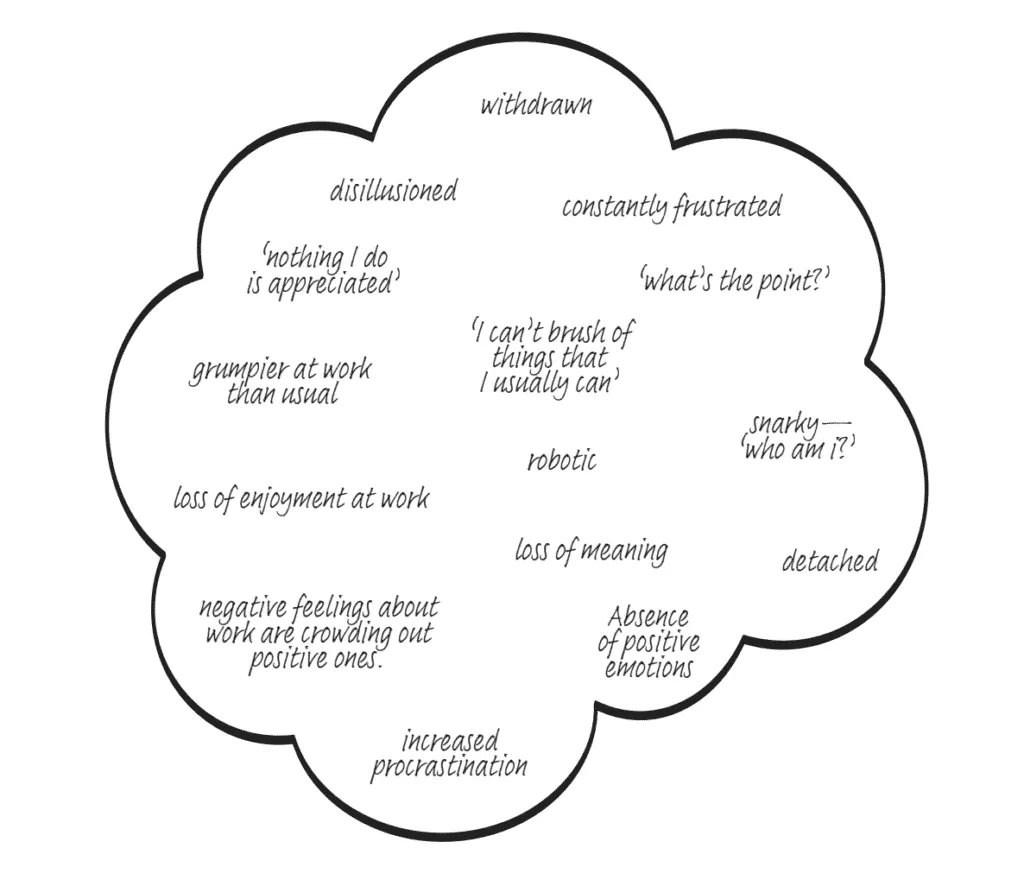The second red flag of burnout: Cynicism or depersonalisation

Someone suffering from burnout is likely to show a combination of three signs that I like to call ‘the red flags of burnout’. To look out for yourself as well as the people you lead, it’s important to keep an eye out for them – chronic exhaustion, cynicism or depersonalisation, and a reduced sense of accomplishment or professional efficacy. Knowing these early signs helps reduce the chance of burnout going undetected and helps to spot out burnout before it causes harm – to the person and the organisation.
I’ve already covered the first red flag in another blog, which you can read here. Today, I’m looking a little closer at the second red flag in this exclusive excerpt from by book, Beyond Burnout.
RED FLAG #2: CYNICISM OR DEPERSONALISATION

When I look back at my own experience of burnout, while I was exhausted, I was also beginning to demonstrate the second red flag of burnout — cynicism and detachment. I have an at-times ‘Pollyanna’-ish sense of enthusiasm. However, as I began to sink under the weight of exhaustion and inefficacy, with no end in sight, I found my usual ‘glass-half-full’ approach replaced by snarky cynicism. This cynicism was especially directed towards our US head office, whom I blamed for taking away my ability to have control over what we were doing in our New Zealand office. I even shot off a few (almost) career-limiting emails during this time to my boss’s boss. Eek! A colleague later told me how weird it was to witness this ‘Cynical Suzi’. It certainly wasn’t the manager he knew.
If it was strange to witness, it was even stranger to experience. I began to withdraw and detach — even from family and friends. People experiencing burnout find no joy where they once delighted in whatever work they were doing. This detachment forms the second key symptom of burnout — a prevalence of cynicism and depersonalisation (when you start to feel distant or have an indifferent attitude towards work). The burned-out person becomes increasingly cynical. And if their default approach was somewhat cynical to start with, they can become downright disparaging.
When a person is experiencing burnout, empathy drops and emotional distance rises. Pessimism, irritability and mistrust abound. And they can infiltrate all aspects of that person’s professional life. It can even show up as bitterness, directed towards colleagues, customers or clients or patients, the organisation itself — or, perhaps most destructively, towards themselves.
This cynicism and depersonalisation can have particularly significant implications for those who do ‘people-focused’ work or those in the ‘helping professions’. Medical professionals, social workers, teachers, firefighters, paramedics and police all fall into this camp, as caring for others is central to their role.
Cynicism packs a big punch when it impacts not only those who are suffering, but also those people the burned-out person is interacting with. A burned-out teacher with increased cynicism may connect less with the children she teaches. The burned-out police officer with increased cynicism is more likely to act with less empathy or emotional regulation with the public. And physician burnout has been linked to compromised patient safety, unprofessionalism and lower patient satisfaction.
Take Jenny again, who I mentioned in my first blog about the red flags of burnout:
‘I really withdrew from any meaningful relationships with colleagues. I couldn’t even listen to people in a room talk about problems, I didn’t want to bloody know about it. I couldn’t deal with it . . . I really felt like I wasn’t doing anything. Ward rounds were far less enjoyable; it was just that I felt I couldn’t connect with patients at all. And usually I’m quite a friendly person, and I just didn’t want to extend that friendship aspect.’
It doesn’t take a rocket scientist to see that cynicism in the workforce is a dangerous and contagious virus that spreads throughout teams and organisations. With the backdrop of engagement in organisations across the globe being at an all-time low — something that every HR professional and CEO alike is wringing their hands about — cynicism is like adding fuel to the low-engagement fire.
Resentment and cynicism are two sides of the same coin. People suffering burnout who I interviewed while researching for Beyond Burnout spoke of this link and how resentment was an unwelcome and often surprising visitor that accompanied cynicism, which they had not experienced previously in their professional lives.
Take Lucy, who recalls:
‘Once resentment kicks in, it becomes a game of the last straw, but the last straw happened many times before I had the guts to quit. Burnout is a catalyst for realising that you don’t love something quite as much as you thought you did. Because I can guarantee that I’ve worked harder than I worked then, and not felt burned out, 100 per cent. But how I felt about my work at the time of experiencing burnout was different. Resentment is such a big thing. Resentment is the road to divorce from your work.’
SOME QUESTIONS WHICH MAY INDICATE BURNOUT-LEVEL CYNICISM AND DEPERSONALISATION
- Have you developed a negative attitude towards your job, your colleagues or clients/service recipients/patients that wasn’t there before?
- Are you noticing a withdrawal from your job and its associated problems or challenges?
- Do you frequently feel disillusioned about your job?
- Have you become cynical or critical at work?
- Are you experiencing a lack of recognition or not feeling rewarded for good work recently?
- Are you quicker to anger, more irritable or do you have less patience with those you work with than usual? Are you overreacting to minor nuisances?
- Are you calling in sick or looking for excuses to get out of work on a regular basis (behaviour which is ‘not like you’)?
- Do you find yourself avoiding social events (particularly work-related ones) that you once looked forward to?
- Do you have less patience, empathy and enthusiasm than normal?
- Have others commented that you seem careless in your relationship to your clients/service recipients/patients?
- Do you overall feel frustrated because of your work?
- Have you lost your enthusiasm for the job?
If you answered ‘yes’ to some or most of these questions, it could be a sign that you are experiencing burnout.
There is one more red flag to help identify burnout, which I’ll be covering in an upcoming blog. If you are wanting to learn more about any of the three red flags and how to stamp out burnout in your organisation, you can grab a copy of my book Beyond Burnout here and here.





4 Comments
This is good, common sense, easily digestible, commentary!
Thank you Suzi.
Brilliant article, I have recently walked away in part due to exactly the above.
LOOOOOL. "Loss of enjoyment at work."
What kind of workaholic nutbag enjoys working? I am in my 40s and I have never ever had "enjoyment" from working. Jobs are a necessary evil so I don't have to starve or sleep in the rain.
Just think we were born with opposable thumbs and we used them to create a miserable capitalist dystopia for ourselves.
I work with refugees from the Ukrainian war and currently am doing some very long hours. The worst is when the resentment and cynicism creep up on you. It can almost feel righteous but it just causes a detachment between yourself and the people you're trying to help or engage with. Yes as employees there are things we can do to minimize our own burnout. But...leaders have to recognize and anticipate it in advance also or it causes even more disengagement & the impression they don't care.
Leave a comment